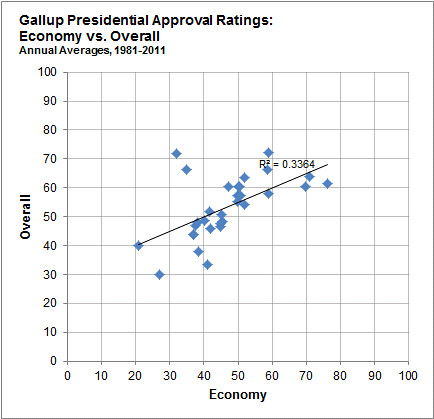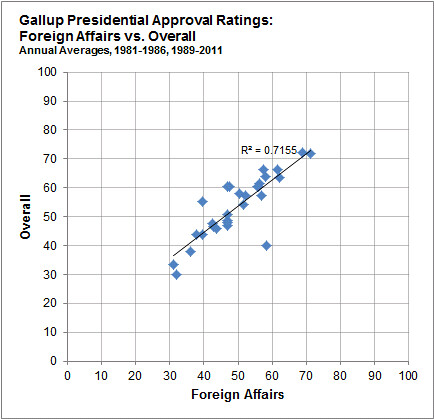

The conventional wisdom of American politics – indeed the conventional wisdom on electoral democracy in general – was captured by James Carville nineteen years ago: “It’s the economy, stupid.” The trope has serious evidence behind it. The importance of the economy in determining voting behavior has a half-century of empirical political science behind it. To try to delve into it would require a footnote alone too long for a blog post. But is it just the economy, stupid, as Carville no doubt wished (his candidate ran against an incumbent whose management of war in Kuwait was far more successful than his management of the recession at home)? Nate Silver, an electoral (and sports) statistician at the New York Times, doesn’t think so. He ran regressions on the correlation between a President’s approval rating overall and on foreign policy, as well as regressions on the correlation between approval on handling on the economy and overall approval. Shockingly, he found that approval of foreign policy was a more significant predictor of overall approval rating than approval of handling of the economy. For the former, the r2=0.72, while for the later r2=0.34. In lay terms: both approval of handling of the economy and handling of foreign affairs are significant predictors of a President’s overall approval ratings, but foreign affairs are a better predictor. Silver is careful to note that correlation does not imply causation, and that it is difficult to determine whether support for the President on certain issues causes or is caused by support for the President overall (the political science literature suggests most voters are shockingly unsophisticated about politics). While it is hard to determine exactly how the relationship between these three variables work, he provides powerful evidence that voters can, as Silver says, “walk and chew gum at the same time.”
ZM cf





0 komentar:
Post a Comment